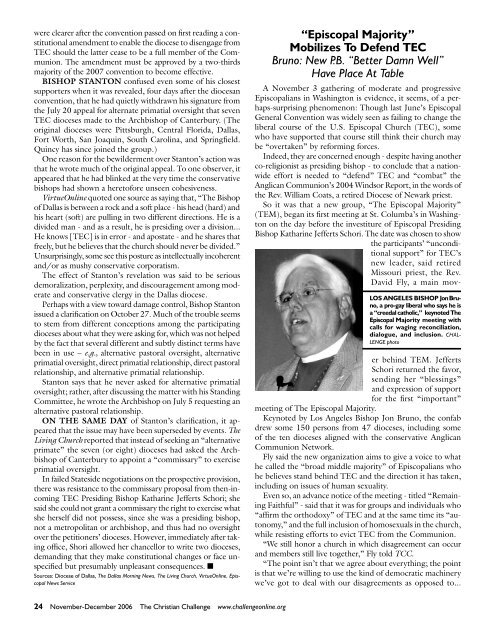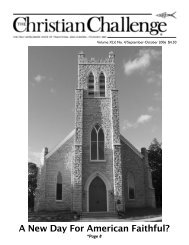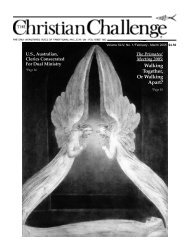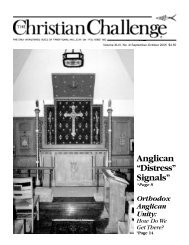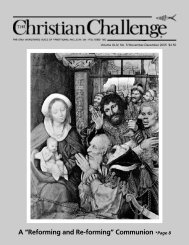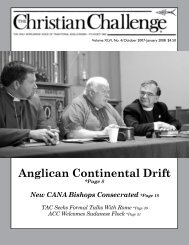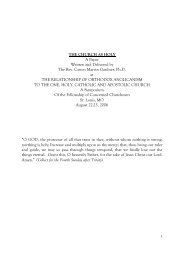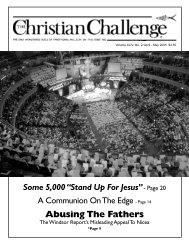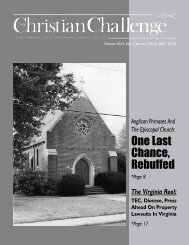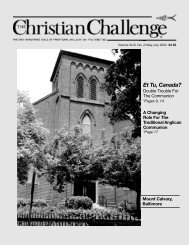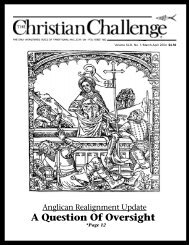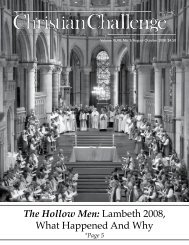Church Planting For The 21st Century - The Christian Challenge
Church Planting For The 21st Century - The Christian Challenge
Church Planting For The 21st Century - The Christian Challenge
Create successful ePaper yourself
Turn your PDF publications into a flip-book with our unique Google optimized e-Paper software.
were clearer after the convention passed on first reading a constitutional<br />
amendment to enable the diocese to disengage from<br />
TEC should the latter cease to be a full member of the Communion.<br />
<strong>The</strong> amendment must be approved by a two-thirds<br />
majority of the 2007 convention to become effective.<br />
BISHOP STANTON confused even some of his closest<br />
supporters when it was revealed, four days after the diocesan<br />
convention, that he had quietly withdrawn his signature from<br />
the July 20 appeal for alternate primatial oversight that seven<br />
TEC dioceses made to the Archbishop of Canterbury. (<strong>The</strong><br />
original dioceses were Pittsburgh, Central Florida, Dallas,<br />
<strong>For</strong>t Worth, San Joaquin, South Carolina, and Springfield.<br />
Quincy has since joined the group.)<br />
One reason for the bewilderment over Stanton’s action was<br />
that he wrote much of the original appeal. To one observer, it<br />
appeared that he had blinked at the very time the conservative<br />
bishops had shown a heretofore unseen cohesiveness.<br />
VirtueOnline quoted one source as saying that, “<strong>The</strong> Bishop<br />
of Dallas is between a rock and a soft place - his head (hard) and<br />
his heart (soft) are pulling in two different directions. He is a<br />
divided man - and as a result, he is presiding over a division...<br />
He knows [TEC] is in error - and apostate - and he shares that<br />
freely, but he believes that the church should never be divided.”<br />
Unsurprisingly, some see this posture as intellectually incoherent<br />
and/or as mushy conservative corporatism.<br />
<strong>The</strong> effect of Stanton’s revelation was said to be serious<br />
demoralization, perplexity, and discouragement among moderate<br />
and conservative clergy in the Dallas diocese.<br />
Perhaps with a view toward damage control, Bishop Stanton<br />
issued a clarification on October 27. Much of the trouble seems<br />
to stem from different conceptions among the participating<br />
dioceses about what they were asking for, which was not helped<br />
by the fact that several different and subtly distinct terms have<br />
been in use – e.g., alternative pastoral oversight, alternative<br />
primatial oversight, direct primatial relationship, direct pastoral<br />
relationship, and alternative primatial relationship.<br />
Stanton says that he never asked for alternative primatial<br />
oversight; rather, after discussing the matter with his Standing<br />
Committee, he wrote the Archbishop on July 5 requesting an<br />
alternative pastoral relationship.<br />
ON THE SAME DAY of Stanton’s clarification, it appeared<br />
that the issue may have been superseded by events. <strong>The</strong><br />
Living <strong>Church</strong> reported that instead of seeking an “alternative<br />
primate” the seven (or eight) dioceses had asked the Archbishop<br />
of Canterbury to appoint a “commissary” to exercise<br />
primatial oversight.<br />
In failed Stateside negotiations on the prospective provision,<br />
there was resistance to the commissary proposal from then-incoming<br />
TEC Presiding Bishop katharine Jefferts Schori; she<br />
said she could not grant a commissary the right to exercise what<br />
she herself did not possess, since she was a presiding bishop,<br />
not a metropolitan or archbishop, and thus had no oversight<br />
over the petitioners’ dioceses. However, immediately after taking<br />
office, Shori allowed her chancellor to write two dioceses,<br />
demanding that they make constitutional changes or face unspecified<br />
but presumably unpleasant consequences. n<br />
Sources: Diocese of Dallas, <strong>The</strong> Dallas Morning News, <strong>The</strong> Living <strong>Church</strong>, VirtueOnline, Episcopal<br />
News Service<br />
2 November-December 2006 <strong>The</strong> <strong>Christian</strong> <strong>Challenge</strong> www.challengeonline.org<br />
“Episcopal Majority”<br />
Mobilizes To Defend TEC<br />
Bruno: New P.B. “Better Damn Well”<br />
Have Place At Table<br />
A November 3 gathering of moderate and progressive<br />
Episcopalians in Washington is evidence, it seems, of a perhaps-surprising<br />
phenomenon: Though last June’s Episcopal<br />
General Convention was widely seen as failing to change the<br />
liberal course of the U.S. Episcopal <strong>Church</strong> (TEC), some<br />
who have supported that course still think their church may<br />
be “overtaken” by reforming forces.<br />
Indeed, they are concerned enough - despite having another<br />
co-religionist as presiding bishop - to conclude that a nationwide<br />
effort is needed to “defend” TEC and “combat” the<br />
Anglican Communion’s 2004 Windsor Report, in the words of<br />
the Rev. William Coats, a retired Diocese of Newark priest.<br />
So it was that a new group, “<strong>The</strong> Episcopal Majority”<br />
(TEM), began its first meeting at St. Columba’s in Washington<br />
on the day before the investiture of Episcopal Presiding<br />
Bishop katharine Jefferts Schori. <strong>The</strong> date was chosen to show<br />
the participants’ “unconditional<br />
support” for TEC’s<br />
new leader, said retired<br />
Missouri priest, the Rev.<br />
David Fly, a main mov-<br />
LOS ANGELES BISHOP Jon Bruno,<br />
a pro-gay liberal who says he is<br />
a “creedal catholic,” keynoted <strong>The</strong><br />
Episcopal Majority meeting with<br />
calls for waging reconciliation,<br />
dialogue, and inclusion. CHAL-<br />
LENGE photo<br />
er behind TEM. Jefferts<br />
Schori returned the favor,<br />
sending her “blessings”<br />
and expression of support<br />
for the first “important”<br />
meeting of <strong>The</strong> Episcopal Majority.<br />
keynoted by Los Angeles Bishop Jon Bruno, the confab<br />
drew some 150 persons from 47 dioceses, including some<br />
of the ten dioceses aligned with the conservative Anglican<br />
Communion Network.<br />
Fly said the new organization aims to give a voice to what<br />
he called the “broad middle majority” of Episcopalians who<br />
he believes stand behind TEC and the direction it has taken,<br />
including on issues of human sexuality.<br />
Even so, an advance notice of the meeting - titled “Remaining<br />
Faithful” - said that it was for groups and individuals who<br />
“affirm the orthodoxy” of TEC and at the same time its “autonomy,”<br />
and the full inclusion of homosexuals in the church,<br />
while resisting efforts to evict TEC from the Communion.<br />
“We still honor a church in which disagreement can occur<br />
and members still live together,” Fly told TCC.<br />
“<strong>The</strong> point isn’t that we agree about everything; the point<br />
is that we’re willing to use the kind of democratic machinery<br />
we’ve got to deal with our disagreements as opposed to...


